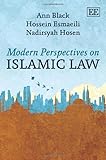Modern perspectives on Islamic law / Ann Black, Associate Professor of Law, TC Beirne School of Law, the University of Queensland, Australia, Hossein Esmaeili, Associate Professor of Law, Flinders Law School, Flinders University, Australia, Nadirsyah Hosen, Senior Lecturer, University of Wollongong, Australia.
Material type: TextPublisher: Cheltenham, UK : Edward Elgar, [2013]Description: xviii, 300 pages ; 24 cmContent type: text Media type: unmediated Carrier type: volumeISBN: 9780857934468; 0857934465; 9781782545521; 1782545522Other title: Islamic lawSubject(s): Islamic law | Islam | Droit religieux | Islamic law | Islam | Recht | Islamisk rättDDC classification: 340.59 LOC classification: KBP144 | .B55 2013
TextPublisher: Cheltenham, UK : Edward Elgar, [2013]Description: xviii, 300 pages ; 24 cmContent type: text Media type: unmediated Carrier type: volumeISBN: 9780857934468; 0857934465; 9781782545521; 1782545522Other title: Islamic lawSubject(s): Islamic law | Islam | Droit religieux | Islamic law | Islam | Recht | Islamisk rättDDC classification: 340.59 LOC classification: KBP144 | .B55 2013| Item type | Current library | Call number | Copy number | Status | Notes | Date due | Barcode |
|---|---|---|---|---|---|---|---|
 Books
Books
|
Female Library | KBP144 .B55 2013 (Browse shelf (Opens below)) | 1 | Available | STACKS | 51952000202752 | |
 Books
Books
|
Female Library | KBP144 .B55 2013 (Browse shelf (Opens below)) | 2 | Available | STACKS | 51952000347989 | |
 Books
Books
|
Main Library | KBP144 .B55 2013 (Browse shelf (Opens below)) | 1 | Available | STACKS | 51952000202745 | |
 Books
Books
|
Main Library | KBP144 .B55 2013 (Browse shelf (Opens below)) | 2 | Available | STACKS | 51952000347996 |
Browsing Main Library shelves Close shelf browser

|

|

|

|

|

|

|
||
| KB260 .K478 2006 War and peace in the law of Islam / | KB260 .R44 2005 Islamic state practices, international law and the threat from terrorism : a critique of the 'clash of civilizations' in the new world order / | KBP144 .A448 2016 Modern challenges to Islamic law / | KBP144 .B55 2013 Modern perspectives on Islamic law / | KBP144 .B55 2013 Modern perspectives on Islamic law / | KBP144 .D54 2004 Islamic law : from historical foundations to contemporary practice / | KBP144 .H356 2009 Sharīʻa : theory, practice, transformations / |
Includes bibliographical references and index.
The nature of law, and its relationship with religion, in Islam -- Islamic law and institutions -- Seeing a Western nation through Muslim eyes: citizenship and the Sharia in modern nation-states -- Fatwa and muftis -- Islamic family law -- Mediation, arbitration and Islamic alternative dispute resolution -- Islamic law and economics -- Property rights, inheritance law and trusts (waqf) -- Islamic criminal law -- Contemporary debates on and within Islam.
This well-informed book explains, reflects on and analyses Islamic law, not only in the classical legal tradition of Shari'a, but also its modern, contemporary context. The book explores the role for Islamic law in secular Western nations and reflects on the legal system of Islam in its classical context as applied in its traditional homeland of the Middle East and also in South East Asia. Written by three leading scholars from three different backgrounds: a Muslim in the Sunni tradition, a Muslim in the Shia tradition, and a non-Muslim woman - the book is not only unique, but also enriched by differing insights into Islamic law. Sir William Blair provides the foreword to book which acknowledges that Islam continues to play a vital role not just in the Middle East but across the wider world, the discussion on which the authors embark is a crucial one. The book starts with an analysis of the nature of Islamic law, its concepts, meaning and sources, as well as its development in different stages of Islamic history. This is followed by accounts of how Islamic law is being practised today. Key modern institutions are discussed, such as the parliament, judiciary, dar al-ifta, political parties, and other important organisations. It continues by analysing some key concepts in our modern times: nation state, citizenship, ummah, dhimmah (recognition of the status of certain non-Muslims in Islamic states), and the rule of law. The book investigates how in recent times, more and more fatwas are issued collectively rather than emanating from an individual scholar. The authors then evaluate how Islamic law deals with family matters, economics, crime, property and alternative dispute resolution. Lastly, the book revisits certain contemporary issues of debate in Islamic law such as burqa, halal food, riba (interest) and apostasy. Modern Perspectives on Islamic Law will become a standard scholarly text on Islamic law. Its wide-ranging coverage will appeal to researchers and students of Islamic law, or Islamic studies in general. Legal Practitioners will also be interested in the comparative aspects of Islamic law presented in this book.
1 2

There are no comments on this title.